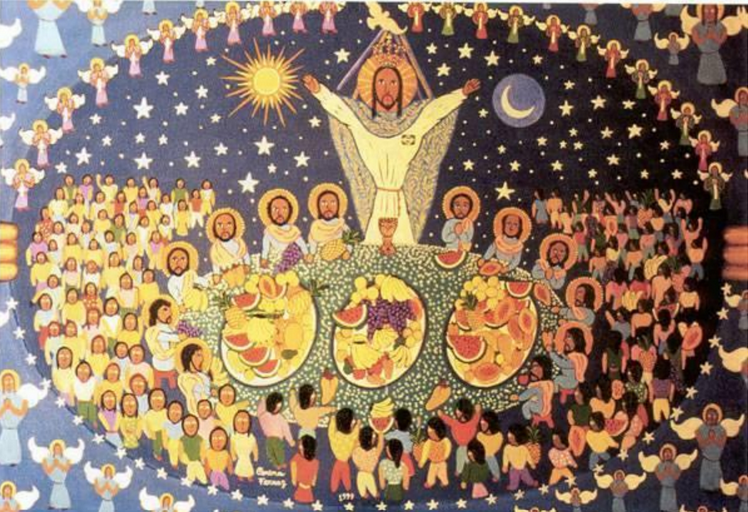Sermon given by Kevin Montgomery at St. Paul’s Episcopal Church, Seattle on October 15, 2023, the 20th Sunday after Pentecost, at 8:00am and 10:30am masses.
Matthew’s Jesus can be hard to swallow. This is supposed to be the Good News, but where is it? At this point in the story, he’s overthrown the money changers. He’s now denouncing the religious authorities to their faces, “Woe to you blind guides. . . . Woe to you, scribes and Pharisees, hypocrites!” and giving parables of judgment against them. Here we have the story of a wedding where those who decline the invitation are killed and their city is burned; and one person who accepts the invitation is thrown out for wearing the wrong outfit. Where’s the good news in that? Where’s the grace?
Well, let’s dive into this and see what’s with this wedding. At this time and place, the rich and powerful would throw a banquet or such to show off their wealth and status. They would then invite other elites with the expectation they’d return the favor in some way. It was also standard practice to send an initial announcement of the upcoming festivities, sort of like a “Save the Date” card today. When everything was ready, an invitation to come would be sent. That would also give the invitees a chance to see who was on the list. “So who else is coming?” Maybe the intended guests didn’t like who was going to be there. Maybe they didn’t like the king. Either way, to refuse the summons would be a grave insult. To kill the king’s servants? Well, that’s treason. That’s rebellion. An earthly king would have been expected to punish them severely.
But we’re not talking about an earthly king here. This heavenly king does the unexpected. He doesn’t replace one set of elites with another. He sends his servants out of the city, to the highways and byways, the squares and the crossroads, to gather all those they find. These are the outsiders who are being brought in. Mind you, this is not about Jews being replaced by Christians or one chosen people being replaced by another. This is about opening up the feast, the messianic banquet, to those who otherwise would not have been able to come.These aren’t necessarily the people with wealth and status who can throw a party for the king or return extravagant favors. In Luke’s version of the parable, they’re the poor, the crippled, the blind, and the lame. In Matthew’s, the servants gather both the good and the bad. By “bad” what do we mean? Morally? Sure. Prostitutes, tax collectors and sinners. Perhaps also those who might not fit into “polite society,” those who don’t quite “fit in,” those who just aren’t the “right kind of people.” And it might include some of us too. Being invited to a king’s party when you just might not deserve it, that sounds like a pretty nice gift.
And we’re not just allowed in either. The king, the ruler, God sends servants out to bring us to the feast. Think of the prophets in the Hebrew Scriptures, the apostles of the church; and speaking through them is the Holy Spirit, the conveyor of grace. In the collect, we heard a request that God’s grace “may always precede and follow us.” Forgive me for going all Wesleyan on you for a second. (With my Methodist heritage, I can’t help it.) But one of the key points in John Wesley’s theology is what is known as prevenient grace. This is the aspect of grace that goes before us and provides a light for the path, that shows us the good and lets us want it. It invites us to come to the palace that we might never have thought we’d visit. It’s like the porch where we gather as we’re brought into the great house we never dared enter. There we’re greeted and declared worthy of coming inside. Put on the wedding garment of holiness and celebrate.
Oh, wait, what about the guy that didn’t have one? Well, it was not unusual at the time for the host to provide robes to guests who didn’t have them. And if all these people were brought in off the streets, how many of them would have been wearing their fancy dress? So perhaps everyone got a robe, but this person wasn’t wearing it. That means they refused the one that was offered or got rid of it. Why? Maybe it was a sign of disrespect to the host’s hospitality or just disregard of the dignity of the event and the other guests. Or perhaps the person already had clothes they thought were better than what was provided. They wanted people to see them and give them a place of honor at the banquet, to treat them with the respect they obviously deserved. Regardless, this person didn’t get it. They totally missed the point of the celebration. When called out on it, they couldn’t or wouldn’t give a response. No apology, no request for a new garment, silence.
The really annoying thing about God’s grace is that just because you accept the invitation, that doesn’t mean everything’s all hunky-dory. There’s a cost. I’m not talking about returning the favor or having to follow an exacting set of rules. No, it’s about letting ourselves be transformed. To put on Christ is to become a new person who shows forth the fruit of new life. To put on Christ is to clothe yourself with compassion, kindness, humility, meekness, and patience, as St. Paul writes. It’s not just to answer the call of God’s prevenient grace or accept the gift of justifying grace but to also open ourselves up to the work of sanctifying grace and cooperate with it. To put on this wedding garment is to accept that we are worthy to enter regardless of our place in life. To put on the garment is also to enter that banquet the same as everyone else, even if we think they’re the “wrong” people. But this choice has a cost. We risk making ourselves vulnerable, sitting down not just with those we don’t like but maybe even with those we hate. When we enter the banquet, we don the robe and put off body armor. We take up the food and drink of life and put down the weapons of death. In this time of hyper-polarization, conflict over resources, and especially now with the seemingly endless cycle of destruction in Israel and Gaza, we need to hear this message more than ever. Can you make that choice? Can I make that choice? With God’s grace and your help, I hope so. God, I hope so.

